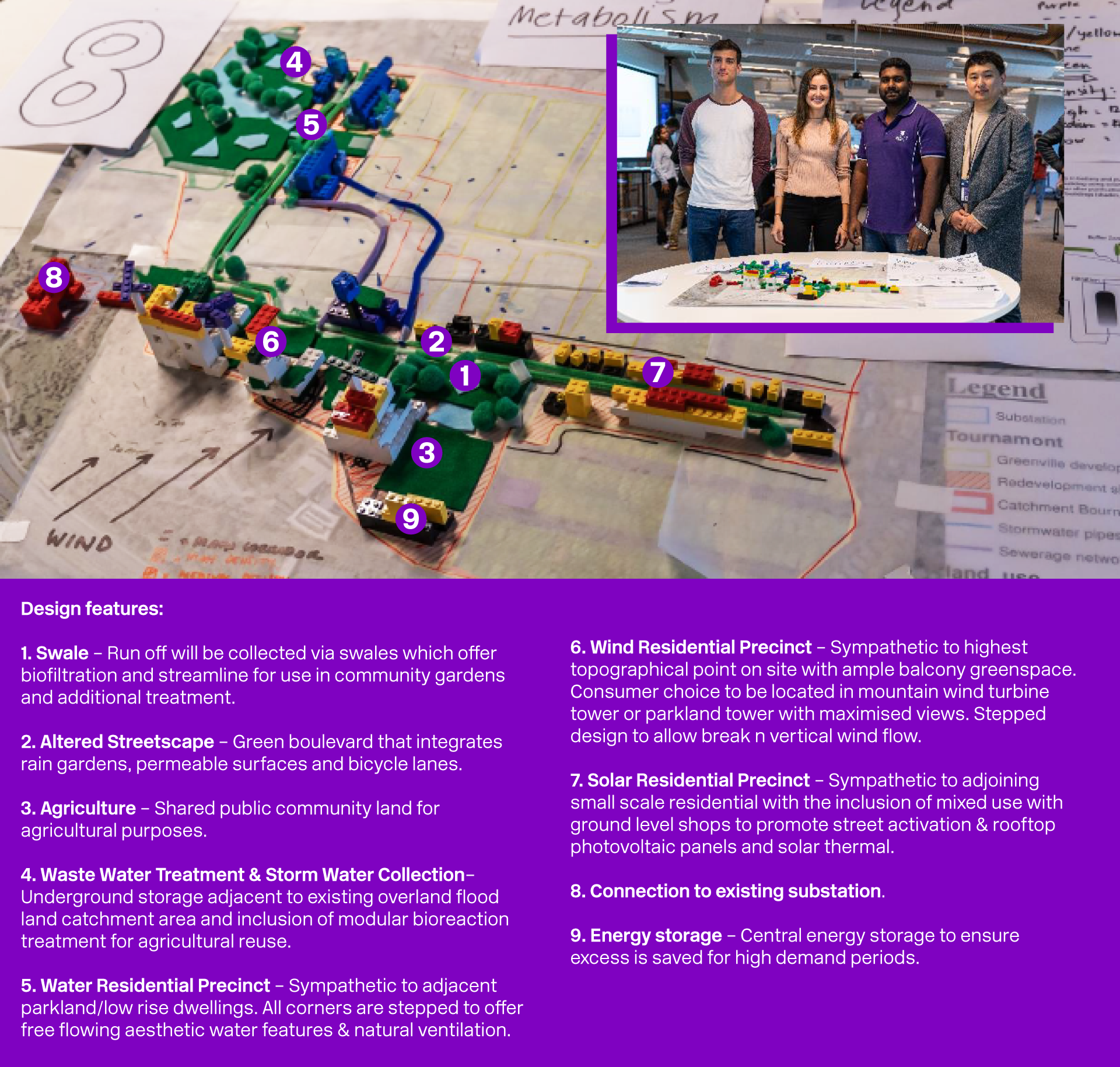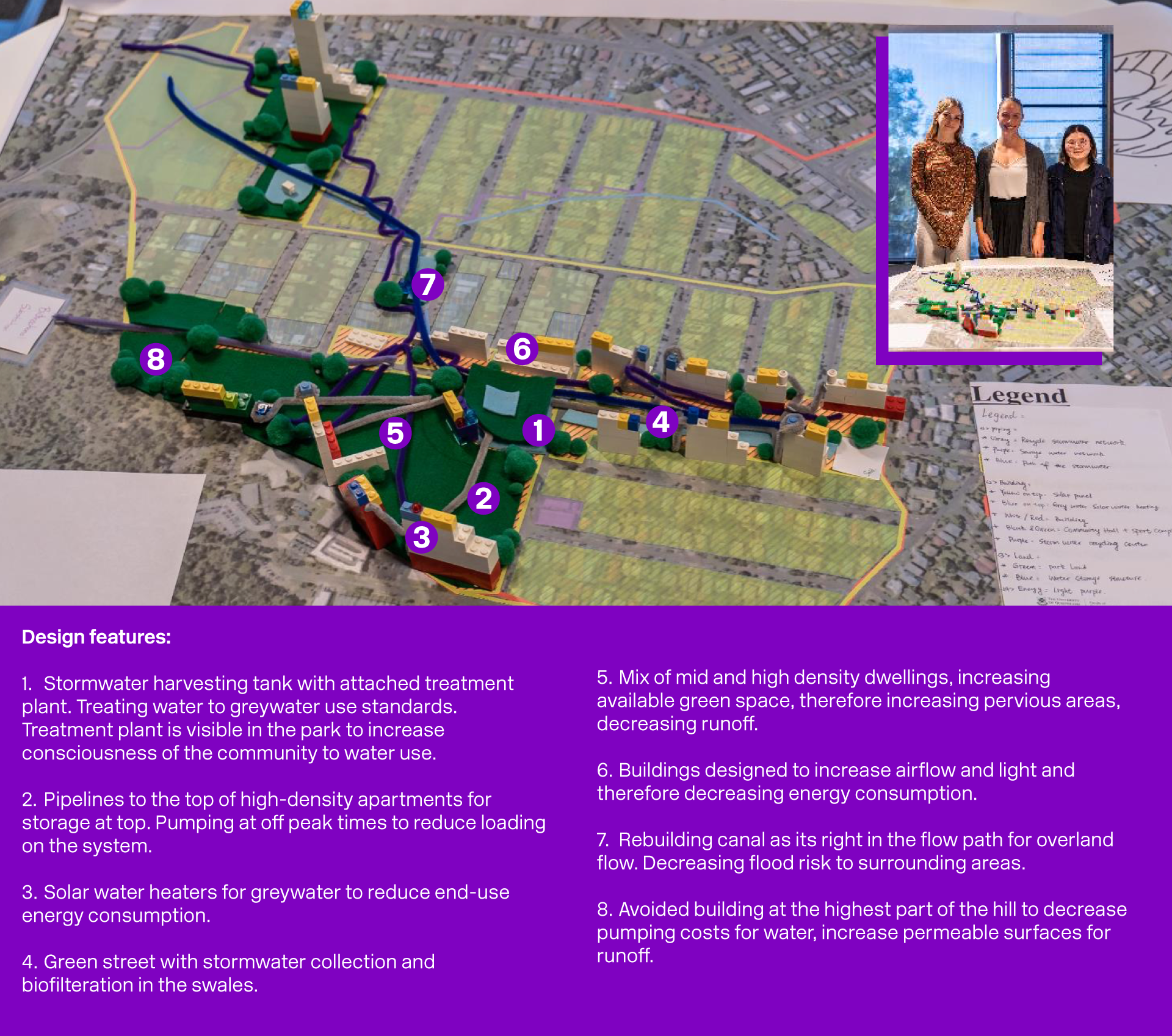Find out what happened at the Water and Energy Systems Integration Winter School Urban Design Challenge!
The Urban Design Challenge Winter School challenges multidisciplinary teams of planners, architects, engineers and others, to create new urban developments that are more liveable, sustainable, resilient and resource efficient.
In a fast-paced competitive environment, eight teams competed in rounds to find ways to create hybrid water and energy systems and integrate into existing infrastructure to support sustainable urban infill development. This tournament (game based) approach encourages water, energy, architecture and planning students to explore performance-based design and planning options in realistic scenarios. It creates a fun, but stressful, environment – a powerful environment for collaboration and learning.
The challenge took place over five days, comprising information sessions on water, energy, planning, and urban design. Site visits provided context and constraints, and design challenges were progressively revealed. Each team developed a management goal, mapped systems, quantified targets and responded to specific challenges through strategic planning and design propositions. They received real time and detailed feedback from industry and academic judges, overseen by impartial referees. And the competitive tournament board kept them on their toes.
After five days of intensive training, each team had three hours to build site-based, architectural and engineering 3D designs from Lego and creative materials. Team Watenbolism—Madeleine John, Jimyeong Park, Ashwin Vijayan Premavally, Thomas Clause and Yanpeng Yin (plan stage)—won the Design and People’s Choice awards. A major strength was that they had consistently advanced their management goal in responding to the challenges. Team Aqucreate—Kelcey Miller, Fei Xiong, Isabella Reynolds, Ho Yee Vivian Lun and and Hadamean Siregar (plan stage)—won the Integration award. They addressed the scenario challenges of water security and peak electricity management consistently in detail.
Team 8: Watenbolism, Winners Design and ‘People’s Choice’
Members: Madeleine John, Jimyeong Park, Ashwin Vijayan Premavally, Thomas Claus, Yanpeng Yin* (*plan stage)
Goal: To create a simultaneous water–energy system that sustainably responds to the available and future metabolic inputs of the city

In Australia, particularly Brisbane, understanding the metabolic cycle of energy and water is considered one of the most important arenas for the continued prosperity, quality of life and overall sustainability of cities as they enter what is called the ‘century of the infinite planet’. Accordingly, this proposal explores the water-energy nexus in terms of its interconnections or cause and effect relationships, and places emphasis on its other integrated links of urban planning, urban agriculture and food production which assists in the metabolic cycle. We harnessed the existing terrain, technology and natural water flows across the site to improve the living environment, create renewable energy and reduce and redirect water usage with the ultimate goal of creating decentralisation. The site was divided into three precincts – Water, Wind and Energy consisting of stormwater and waste-water treatment, wind turbines and photovoltaic and solar thermal energy collection. The streetscape has also been altered to incorporate rain gardens, bicycle lanes and permeable surfaces. The course was particularly beneficial through intensive lectures, site visits, and design practices which in a very short period of time have demonstrated how coordination between diverse technologies and community involvement is much needed in achieving a sustainable and inclusive future with transdisciplinary longevity.
Team 3: Aqucreate, Winners Integration
Members: Kelcey Miller, Isabella Reynolds, Fei Xiong, Ho Yee Vivian Lun, Hadamean Siregar* (*plan stage)
Goal: To conserve and diversify water and energy to create a more resilient ad liveable future

The Challenge attracted 37 participants, including urban and regional planning, architecture and engineering students, as well as some industry participants (as part of graduate programs).
Associate Professor Steven Kenway (organiser of the event and CRC for Water Sensitive Cities IRP4 project leader) explained some of the event objectives: ‘The tournament encourages participants to understand and evaluate the key issues, pressures, drivers and trends in urban water and energy management and their interdependencies and connections. But, it is also an invaluable opportunity for participants to learn how to work together and communicate effectively across disciplines. It’s so important for the participants to learn how to appreciate and critically analyse other perspectives. Peer-to-peer learning is a key component of the process.’
Feedback from participants was very positive—most participants stated they preferred this event to other courses they’ve taken.
Tournament participant, Kelcey Miller (Unitywater), said of the event: ‘The overall experience was really good. The competition was really engaging and I loved the site visits. It was incredibly interesting learning about the different drivers and goals of development from the perspective of planners and architects, as I’m mostly only exposed to the engineering side of things. I also learnt a lot about energy and the issues we face there. I hadn’t realised the extent of how much our energy and water usage are tied together.’
This is the first time the event has been completed as a five-day event, supported by a UQ Teaching innovation grant. It was proudly supported by the CRC for Water Sensitive Cities, Ergon Energy, Unitywater, Energy Queensland, Bligh Tanner, the Advanced Water Management Centre (University of Queensland), International Water Centre and Urban Inquiry.
Several UQ schools contributed with leadership from Paola Leardini (Architecture), Alice Strazabosco (Advanced Water Management Centre), Peta Ashworth (Sustainable engineering), Sebastian Darschen (Planning) and Ilje Pikaar (Civil engineering). Dr Steve Conrad (University of British Columbia) provided key international context. He and Associate Professor Kenway are leading tournaments internationally.
Planning for the 2020 Design Challenge in June 2020 is already underway. You can find more information and registration/application details here.